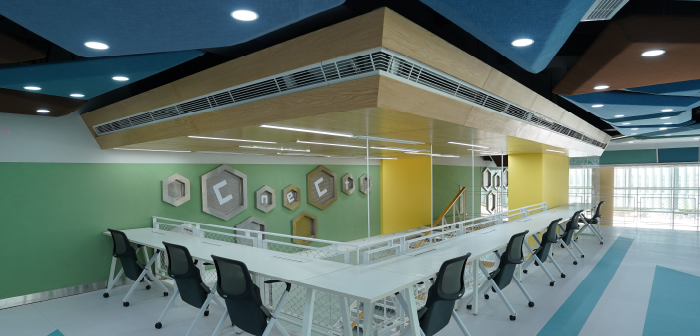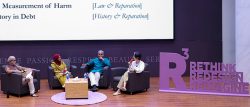In a world defined by rapid technological advancements and evolving global challenges, Habib University continues to pioneer innovation in higher education with the launch of the Institute of Design Thinking, Entrepreneurship, and Leadership (IDEAL). This groundbreaking initiative marks a significant step in the University’s commitment to promoting agile problem-solving, entrepreneurial thinking, and collaborative leadership among students and industry professionals alike.
The inauguration ceremony, held at Habib University’s campus on the 6th of April 2025, featured a keynote address by President Wasif Rizvi. Narrating Habib University’s mission of transforming Pakistan’s higher education landscape, he spoke about IDEAL’s importance in strengthening the industry-academia relations and forming an intellectual partnership, “Our very credible grounding within design thinking acts as a great catalyst for industry to look at us as a key partner. It inspires the core pedagogical practices at Habib University. IDEAL is a space for students, faculty and industry leaders. We want to have a continuous platform for our students and many participants from industry to work together to solve their mutual problems.”
The address was followed by an insightful talk from Susan Giesecke, Director of Engagements at the Sutardja Center for Entrepreneurship & Technology (SCET) at UC Berkeley. With extensive expertise in corporate innovation and global partnerships, Giesecke emphasized the vital role of design thinking in promoting creativity, adaptability, and cross-sector collaboration. “I congratulate Habib University for opening this space. It’s an incredible space where now you have an opportunity to learn yourselves as we develop professional development programs and to give back to the community,” she said.
The closing remarks of the inauguration were delivered by Mohemedali Rafiq, member of Habib University’s Board of Governors, and Chairman of the Board of Directors, Habib Metropolitan Bank Limited. “The return on the investment that you (the community) will achieve and enjoy here at Habib University’s IDEAL is unparalleled – and that’s what makes this so worthwhile. Our mission here is not just to be an institution of excellence, but to inspire,” he shared.
The IDEAL initiative builds upon the University’s history of pioneering academic spaces such as The Playground: Centre for Transdisciplinarity, Design, and Innovation, and The Horizon, a futuristic classroom promoting collaboration and critical thinking. Now, with IDEAL, Habib University takes an even bolder step by bridging academia and industry, offering a platform where students and professionals co-create innovative solutions to contemporary challenges. Habib University is also the first higher education institution in Pakistan to introduce design thinking in its curriculum.
The launch of IDEAL also included a Memorandum of Understanding (MoU) signing, cementing strategic partnerships with industry leaders. These collaborations aim to integrate real-world challenges into academic learning, empowering students with the skills necessary to navigate an unpredictable future.
A New Era of Collaborative Learning
IDEAL is designed to redefine the learning experience by integrating executive education, collaborative innovation labs, and design leadership programs. This forward-thinking approach enables both students and industry professionals to adopt future-proof strategies, ensuring they remain adaptable in an ever-evolving world.
Attendees at the event expressed their excitement for IDEAL’s transformative potential, envisioning it as a catalyst for reshaping the intersection of education and industry. By promoting a culture of experimentation, interdisciplinary collaboration, and critical reflection, IDEAL is set to shape the next generation of proactive, empathetic, and innovative leaders.
With this launch, Habib University reaffirms its mission to lead the way in reimagining higher education, ensuring that its students are not just prepared for the future but are actively shaping it.




